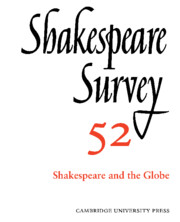Book contents
- Frontmatter
- Reconstructions of the Globe: A Retrospective
- ‘Useful in the Year 1999’: William Poel and Shakespeare’s ‘Build of Stage’
- Reconstructing the Globe: Constructing Ourselves
- From Liturgy to the Globe: the Changing Concept of Space
- The Arithmetic of Memory: Shakespeare’s Theatre and the National Past
- Maximal and Minimal Texts: Shakespeare v. the Globe
- William Shakespeare’s Romeo + Juliet: Everything’s Nice in America?
- Which is the Jew that Shakespeare Knew?: Shylock on the Elizabethan Stage
- A Little Touch of Harry in the Light: Henry V at the New Globe
- Gulls, Cony-Catchers and Cozeners: Twelfth Night and the Elizabethan Underworld
- The Globe, the Court and Measure for Measure
- Macbeth and the Antic Round
- Macbeth / Umabatha: Global Shakespeare in a Post-Colonial Market
- When All is True: Law, History and Problems of Knowledge in Henry VIII
- ‘All which it inherit’: Shakespeare, Globes and Global Media
- ‘Delicious traffick’: Alterity and Exchange on Early Modern Stages
- The 1998 Globe Season
- Shakespeare Performances in England, 1998
- Professional Shakespeare Productions in the British Isles January-December 1997
- The Year's Contributions to Shakespeare Studies 1 Critical Studies
- 2 Shakespeare’s Life, Times, and Stage
- 3 Editions and Textual Studies
- Books Received
- Index
Macbeth / Umabatha: Global Shakespeare in a Post-Colonial Market
Published online by Cambridge University Press: 28 March 2007
- Frontmatter
- Reconstructions of the Globe: A Retrospective
- ‘Useful in the Year 1999’: William Poel and Shakespeare’s ‘Build of Stage’
- Reconstructing the Globe: Constructing Ourselves
- From Liturgy to the Globe: the Changing Concept of Space
- The Arithmetic of Memory: Shakespeare’s Theatre and the National Past
- Maximal and Minimal Texts: Shakespeare v. the Globe
- William Shakespeare’s Romeo + Juliet: Everything’s Nice in America?
- Which is the Jew that Shakespeare Knew?: Shylock on the Elizabethan Stage
- A Little Touch of Harry in the Light: Henry V at the New Globe
- Gulls, Cony-Catchers and Cozeners: Twelfth Night and the Elizabethan Underworld
- The Globe, the Court and Measure for Measure
- Macbeth and the Antic Round
- Macbeth / Umabatha: Global Shakespeare in a Post-Colonial Market
- When All is True: Law, History and Problems of Knowledge in Henry VIII
- ‘All which it inherit’: Shakespeare, Globes and Global Media
- ‘Delicious traffick’: Alterity and Exchange on Early Modern Stages
- The 1998 Globe Season
- Shakespeare Performances in England, 1998
- Professional Shakespeare Productions in the British Isles January-December 1997
- The Year's Contributions to Shakespeare Studies 1 Critical Studies
- 2 Shakespeare’s Life, Times, and Stage
- 3 Editions and Textual Studies
- Books Received
- Index
Summary
Umabatha was presented in 1997 as part of the first season's repertory at the Globe theatre on London's Bankside. It was a curious piece, most memorable for the huge cast of astonishingly agile dancing extras and its energetic, but deafeningly loud, drumming. It was performed in Zulu with English sur-titles taken from text provided by Welcome Msomi and the programme included a scene by scene synopsis of the action. Yet, the play was recognizably Macbeth. It included all the play's familiar elements, including the witches, the bloody sergeant, the dagger scene, the ghost of Ban quo, the murder of Lady Macduff and her son, the sleepwalking scene, and the final battle in which Macbeth is defeated.
The narrative came from Shakespeare but the setting and the style signalled the play's African origins. The witches who opened the action were young women with beaded hair who performed their magic by casting stones (or were they bones?) in a calabash. The cast was dressed in leather skirts and furry leggings, the men were armed with short stabbing-spears. The drunken porter drank liberally from a gourd and when Macbeth saw the witches' vision of the procession of kings, he induced the spectacle by snorting a powder.
- Type
- Chapter
- Information
- Shakespeare Survey , pp. 154 - 165Publisher: Cambridge University PressPrint publication year: 1999
- 3
- Cited by

